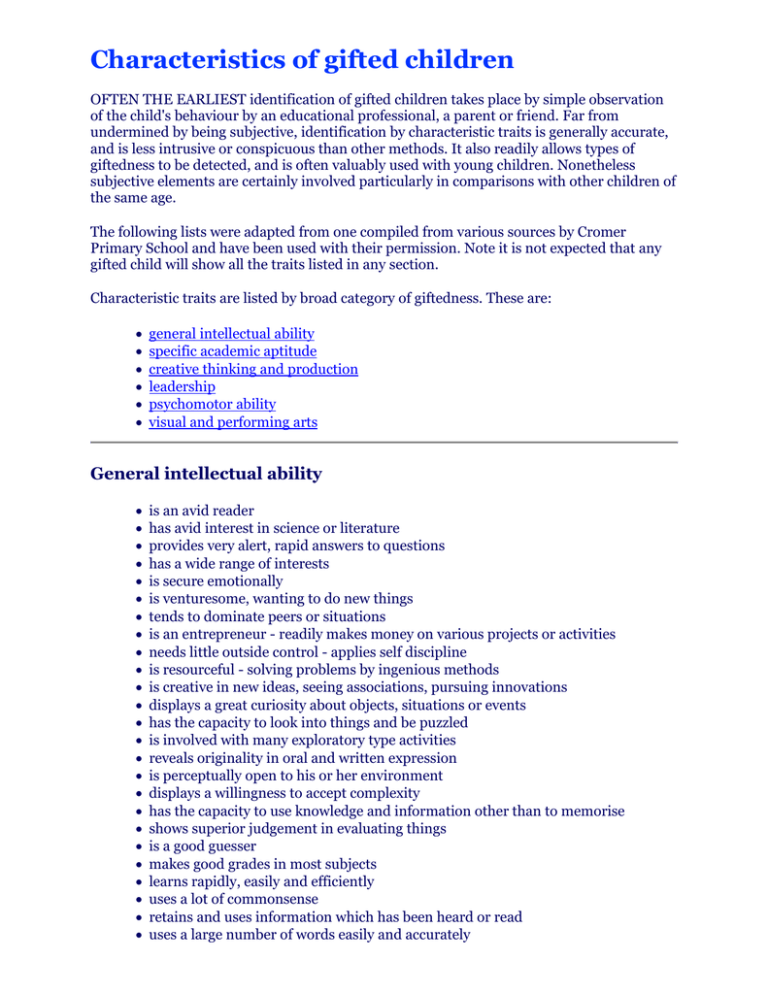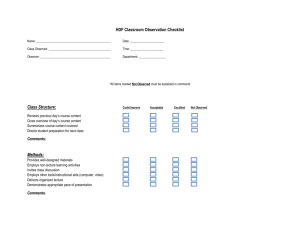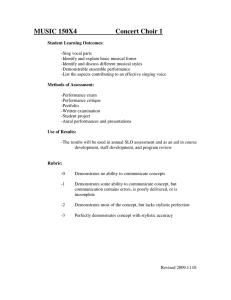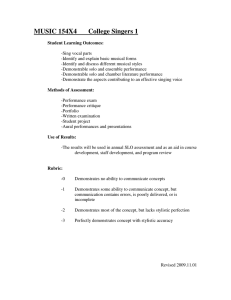Characteristics of gifted children
advertisement

Characteristics of gifted children OFTEN THE EARLIEST identification of gifted children takes place by simple observation of the child's behaviour by an educational professional, a parent or friend. Far from undermined by being subjective, identification by characteristic traits is generally accurate, and is less intrusive or conspicuous than other methods. It also readily allows types of giftedness to be detected, and is often valuably used with young children. Nonetheless subjective elements are certainly involved particularly in comparisons with other children of the same age. The following lists were adapted from one compiled from various sources by Cromer Primary School and have been used with their permission. Note it is not expected that any gifted child will show all the traits listed in any section. Characteristic traits are listed by broad category of giftedness. These are: general intellectual ability specific academic aptitude creative thinking and production leadership psychomotor ability visual and performing arts General intellectual ability is an avid reader has avid interest in science or literature provides very alert, rapid answers to questions has a wide range of interests is secure emotionally is venturesome, wanting to do new things tends to dominate peers or situations is an entrepreneur - readily makes money on various projects or activities needs little outside control - applies self discipline is resourceful - solving problems by ingenious methods is creative in new ideas, seeing associations, pursuing innovations displays a great curiosity about objects, situations or events has the capacity to look into things and be puzzled is involved with many exploratory type activities reveals originality in oral and written expression is perceptually open to his or her environment displays a willingness to accept complexity has the capacity to use knowledge and information other than to memorise shows superior judgement in evaluating things is a good guesser makes good grades in most subjects learns rapidly, easily and efficiently uses a lot of commonsense retains and uses information which has been heard or read uses a large number of words easily and accurately asks many questions of a provocative nature has a power of abstraction, conceptualisation and synthesis has an interest in cause-effect relations has a liking for structure, order and consistency has a power of concentration, an intense attention that excludes all else is persistent has a high energy level is independent is friendly and outgoing Return to checklist menu Specific academic aptitude shows similar characteristics to general intellectual ability but concentrated around one or a few fields has a long attention span in areas of interest learns rapidly, easily and with less repetition in one or a few specific areas (probably not all subject areas) likes or loves one or a few areas of knowledge likes to study some subjects more than others spends time voluntarily beyond ordinary assignments on projects of interest to him or her is able to extend learning from these key areas to various situations somewhat unrelated in orientation is able to show broad perspective on one or more subject areas is able to judge own and others' relative abilities in key areas of interest seeks assistance of others beyond his or age peers in extending knowledge in areas of interest Return to checklist menu Creative thinking and production is fluent in producing and elaborating on ideas makes unusual associations between remote ideas is flexible in thinking patterns senses when problems exist acts spontaneously, intuitively tolerates ambiguity and uncertainty senses inconsistencies and discontinuities readily guesses and makes hypotheses juggles or redefines elements of a problem or task can show intense concentration on a task retains own ideas in a discussion or collaboration provides mulitple solutions or responses to problems is uninhibited in expression, sometimes radical is intellectually playful, interested in fantasy, imagination always trying to adapt or improve things has a keen sense of humour, seeing humour in situations others don't doesn't mind being different doesn't accept authoritarian pronouncements without own judgement asks provocative questions, challenges parents, teachers, written and other authorities is bored with memorisation and recitation displays energy, somtimes disruptively produces unexpected, sometimes "silly" responses is considered, and perhaps resented, by some peers as "crazy" can show unusual degrees of originality, concentration and persistent hard work on projects that capture their interest and imagination Return to checklist menu Leadership can stimulate and arouse others organises others recognises skills and abilities possessed by others interacts with others easily showing social skills recognises and can articulate the goals of a group can articulate ideas clearly can listen to others empathetically understands how people feel and how groups function can give directions clearly and effectively exercises authority reliably and responsibly can adopt non-leadership roles within a group can establish the mood of a group supports others in a group when appropriate can coordinate the work of several individuals is often asked for ideas and suggestions is looked to by others when something must be decided Return to checklist menu Psychomotor ability is rhythmic is athletic likes to play physically has a suitable body build is coordinated, balanced and confident in physical activities is inventive in constructing or modifying games is energetic is able to understand the intellectual aspects of psychomotor activities demonstrates endurance, stamina and persistence in physical activities demonstrates prowess in physical activities common amongst age peers Return to checklist menu Visual and performing arts Music has good sense of rhythm is well-coordinated discriminates musical and other sounds well understands musical relationships enjoys musical activities and demonstrates musical feeling shows tonal memory responds readily to rhythm, melody and harmony uses music to express feeling or experience makes up original tunes enjoys dance and dramatic activities with musical elements Dramatics demonstrates interest and enjoyment in dramatic activities readily shifts into role of another character, animal or object uses voice to reflect changes in mood demonstrates understanding of conflict when acting out a dramatic event communicates feelings by means of facial expressions, gestures and bodily movements enjoys evoking emotional responses from listeners demonstrates ability to dramatise feelings and experiences brings a dramatic situation to a climax with a well-timed ending when telling a story Art draws a variety of objects puts depth into drawing, showing planning and good proportion treats art seriously and enjoys it shows originality in modes of undertaking art is willing to try out new materials and experiences pursues art in spare time uses art to express feelings and experiences is interested in other people's art, both appreciating it and criticising it likes to model three dimensionally with clay, soap carving, plasticine etc


